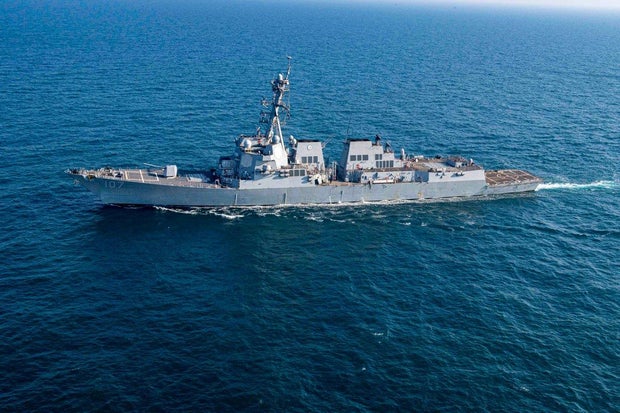In a significant escalation of efforts to combat the proliferation of drugs into the United States attributed to operations by Latin American cartels, the U.S. government, under the administration of President Donald Trump, has initiated the deployment of three guided-missile destroyers to patrol the waters near Venezuela. This tactical deployment includes the USS Gravely, USS Jason Dunham, and USS Sampson, as confirmed by sources within the White House to CBS News. These vessels, integral components of the U.S. Navy’s Aegis combat system fleet, are renowned for their advanced missile defense capabilities, suggesting a robust approach to what the Trump administration perceives as a growing security threat.
The movement of these naval assets aligns with President Trump’s broader security strategy in dealing with the dangers posed by international drug cartels based in Latin America, particularly those operating out of Venezuela. The Defense Department, while discreet about specific operational details due to security considerations, has indicated that the assignment of these ships will span several months, aimed at providing a sustainable and forceful U.S. presence in the region.
This naval maneuver is part of a cascade of measures taken by the Trump administration aimed at disrupting the activities of drug cartels which, according to U.S. authorities, are heavily involved in the trafficking of narcotics like fentanyl-laced cocaine into American cities. These narcotics operations have not only fueled addiction crises but are also believed by the administration to contribute significantly to violence in U.S. communities. The administration’s aggressive stance also includes political pressures, as observed in Trump’s interactions with Mexican President Claudia Sheinbaum, urging greater bilateral cooperation in curbing cartel activities, a proposition that Sheinbaum has cautiously engaged with, wary of overstepping issues of national sovereignty.
In a controversial yet bold move earlier in the year, President Trump designated several groups, including Venezuela’s Tren de Aragua and MS-13 in El Salvador, as foreign terrorist organizations. This designation, historically reserved for groups engaging in political violence like ISIS and al-Qaeda, underscores a paradigm shift in the U.S. approach to dealing with organized crime groups that have sprawling international networks and are involved in varied illegal activities, including human trafficking and territorial violence.
In an unprecedented assertion of this policy stance, the Trump administration has also doubled the reward to $50 million for information leading to the arrest of Venezuelan President Nicolás Maduro, branded by the U.S. as one of the world’s top narco-traffickers. This bold accusation underscores the severity of the alleged complicity of the Venezuelan state under Maduro’s leadership with narcotic operations targeting the U.S., positioning Maduro not merely as a political adversary but a criminal element in the global drug trade arena.
The response from Venezuela to these U.S. actions has been of stark defiance and denunciation. The Venezuelan Foreign Minister, Yvan Gil, was quoted dismissing the U.S. allegations as lacking credibility and as reflective of failed U.S. policies in the region. Gil argued that Venezuela continues to progress peacefully and sovereignly, and criticized U.S. strategies as ineffective and imperialistic. This rhetoric was accompanied by a temporal directive from the Venezuelan government banning drone activities within its airspace, presumably a defensive response to previous incidents like the 2018 drone attack near Maduro during a military event—an incident that markedly strained Venezuela-U.S. relations.
Moreover, amidst escalating tensions, President Maduro announced the mobilization of over 4.5 million militia members to safeguard national integrity against what he referred to as renewed threats from the U.S. These militias, established during the presidency of Hugo Chávez, are envisioned as a people’s army supplementing the Venezuelan armed forces.
The unfolding scenario paints a grim tableau of the complex interplay between national security measures and international drug enforcement policies. With the U.S. deploying significant military assets in proximity to Venezuelan waters, the situation underscores the volatile nexus of international diplomacy, sovereign rights, and global narcotics operations. As these naval destroyers edge closer to Venezuelan shores, the world watches attentively, pondering the potential repercussions this U.S. strategy might provoke amidst already heightened geopolitical tensions in Latin America.









